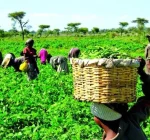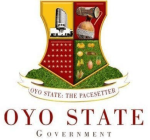Nigeria targets vast agri-investment through new soil health scheme
- 35 Views
- Agribusiness Africa
- October 23, 2025
- News & Analysis
Nigeria has taken a landmark step toward transforming its agricultural productivity with the launch of the National Farmers Soil Health Scheme — a data-driven initiative aimed at ushering in precision agriculture and attracting both local and international investment.
Announcing the scheme at a workshop for the Nigeria Soil Information Systems (SIS), the Minister of State for Agriculture and Rural Development, Senator Sabi Abdullahi, said the programme will end decades of “guesswork” in farming by giving farmers access to soil-specific data that determines the best crop and fertiliser blend for each location.
“For too long, our farmers have planted based on feeling, using any fertiliser blend available. This scheme provides expert-backed advice on what to plant and how to nourish the soil. It lays the foundation for precision agriculture in Nigeria,” he stated.
The initiative addresses persistent challenges such as low yields, poor soil management, and high input costs, which have limited farm profitability and slowed progress toward national food security. Senator Abdullahi highlighted that the new system will also de-risk agricultural investment by offering credible soil data to guide investors and policy planners.
Nigeria, with over 73 million hectares of arable land but only 34 million currently cultivated, stands to benefit significantly from a robust soil information system. The Minister affirmed that the SIS will align with global standards to attract confidence and funding from private and international partners.
The project is receiving strong technical backing from the Regional Hub for Fertiliser and Soil Health at the International Institute of Tropical Agriculture (IITA) in Ibadan, with support from the World Soil Information Centre (ISRIC). IITA Deputy Director General, Dr Bernard Vanlauwe, commended Nigeria’s commitment, noting that the system’s data credibility and comparability with global standards are key for international investors.
With field trials completed and soil samples collected nationwide, the government has now moved from planning to implementation — marking a new era of data-driven agriculture in Nigeria.
Source: Tribune Online
Expert Review for Agri-Food Stakeholders
Nigeria’s National Farmers Soil Health Scheme signals a pivotal shift from conventional to evidence-based agriculture. For stakeholders across the agri-food value chain, this initiative presents critical implications for productivity, investment, and sustainability.
- Precision Agriculture Becomes the New Standard
The scheme eliminates the guesswork in crop production by providing location-specific data on soil composition and nutrient requirements. This will enable farmers to make science-backed decisions, reduce waste, and improve input efficiency — a defining step toward precision agriculture in Nigeria. - Attracting Local and Foreign Investment
A credible, standardised soil information system reduces uncertainty for investors by identifying high-potential agricultural zones. With reliable data, financiers and agribusinesses can channel capital more effectively, making Nigeria’s agricultural sector more bankable and less risky. - Boosting Yields and Reducing Costs
Accurate soil health data helps farmers apply the right fertiliser types and quantities, reducing input costs while boosting yield. This aligns directly with Nigeria’s drive for food sovereignty and export competitiveness under President Tinubu’s administration. - Empowering Research and Policy Planning
By linking institutions like IITA and ISRIC to Nigeria’s soil database, policymakers and researchers can better forecast productivity trends, design region-specific interventions, and monitor sustainability indicators across value chains. - Building Climate Resilience
Healthy soils are central to climate-smart agriculture. The SIS will help identify areas suffering from degradation or nutrient depletion, guiding targeted interventions to restore soil health and enhance resilience to drought and flooding.
In essence, the National Farmers Soil Health Scheme represents a data revolution for Nigerian agriculture — one that could redefine how the nation grows, trades, and sustains its food systems. Its success will depend on continuous data collection, strong extension services, and transparent access to soil information for all stakeholders.











